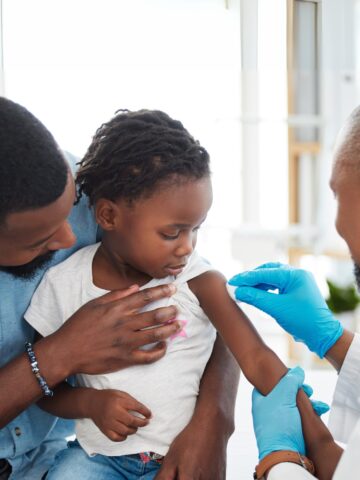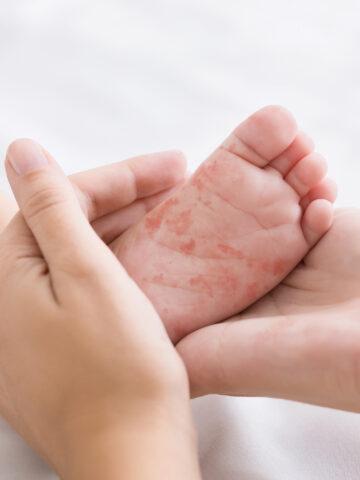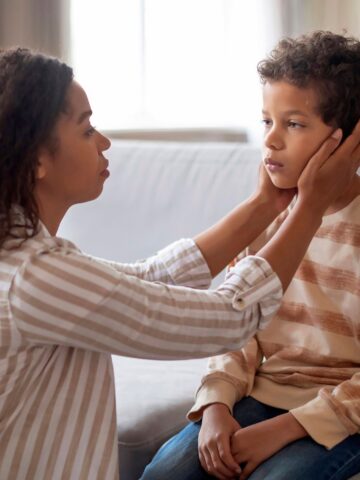Tips for reducing the risk of RSV, rhinoviruses, enteroviruses, flu and COVID-19 in kids
With the change in seasons, colder weather and more time gathering indoors during the fall and winter, it’s common for kids to contract respiratory illnesses. Most kids will be able to recover from illnesses like respiratory syncytial virus (RSV), rhinoviruses (RV), enteroviruses (EV), EV-D68, influenza (flu) and COVID-19 on their own, but babies or others with weakened immune systems may get very sick.
Here, CHOC experts offer best practices for reducing the risk for respiratory illnesses in children.
Tips for preventing RSV in children
Respiratory syncytial virus (RSV) is spread through contact with infected people or contaminated surfaces.
To reduce the risk of RSV infections for kids, families should:
- Wash their hands frequently.
- Stay up to date on all vaccinations.
- Practice healthy sleeping and eating habits.
- Avoid sharing cups, eating utensils and close contact like hugging, kissing or shaking hands with anyone with cold-like symptoms.
To reduce the risk for RSV, the AAP recommends all babies, especially preterm infants:
- Be breastfed.
- Be protected from contact with smoke.
- Limit exposure to crowds, other children and anyone with a cold.
Also, make sure that household members wash their hands or use an alcohol-based hand cleaner before and after touching your baby.
Tips for preventing RV, EV and EV-D68 infections in children
RV, EV and EV-D68 viruses are spread when a child comes in contact the secretions, or germs, of an infected person. They may also become infected by touching objects or surfaces that have the virus on them and then touching their mouth, nose or eyes.
To reduce the risk of RV, EV and EV-D68 infections, kids should:
- Refrain from touching their mouth, nose or eyes.
- Wash their hands frequently.
Parents should make sure to disinfect frequently-used surfaces in the household. In addition, practicing good hygiene and healthy sleep and eating habits will help kids build a strong immunity to illness.
Parents and caregivers should keep young children with acute respiratory illnesses out of childcare, even if they have tested negative for COVID-19.
Tips for preventing flu in children
People with the flu can spread it to others. Most experts think that flu viruses spread mainly by droplets made when people with flu cough, sneeze or talk.
To reduce the risk of getting the flu, kids should:
- Get their annual flu shot.
- Practice proper hand washing, especially before and after eating and using the bathroom.
- Stay away from people who have a fever.
- Practice healthy sleeping and eating habits.
- Mask when indoors or in large group settings.
Families should also make sure that all eligible members of their household receive their annual flu shot. Ask friends, family or caregivers who are sick to stay away from your child. If your child is sick, do not send them to school or daycare.
Kids should also practice proper cough etiquette to prevent further spread. Teach kids to cough or sneeze into a tissue or elbow – making sure to cover their nose and mouth. Parents should model good behavior.
Tips for preventing COVID-19 in kids
COVID-19 is spread primarily through person-to-person contact.
To reduce the risk of COVID-19 infections, kids should:
- Receive a COVID-19 vaccine and booster, if eligible.
- Mask when indoors or in large group settings.
- Avoid close contact with people who are sick.
- Avoid touching their eyes, nose and mouth.
- Stay home when they are sick.
- Practice good cough etiquette.
- Wash their hands often.
Families should also make sure that all eligible members of their household receive their COVID-19 vaccine and booster.
For more health and wellness resources from the pediatric experts at CHOC, sign up for the Kids Health newsletter.
Find a CHOC Primary Care Pediatrician
From babies to teens, pediatricians from CHOC’s Primary Care Network partner with parents to offer immunizations, sick visits, sports physicals and more.






